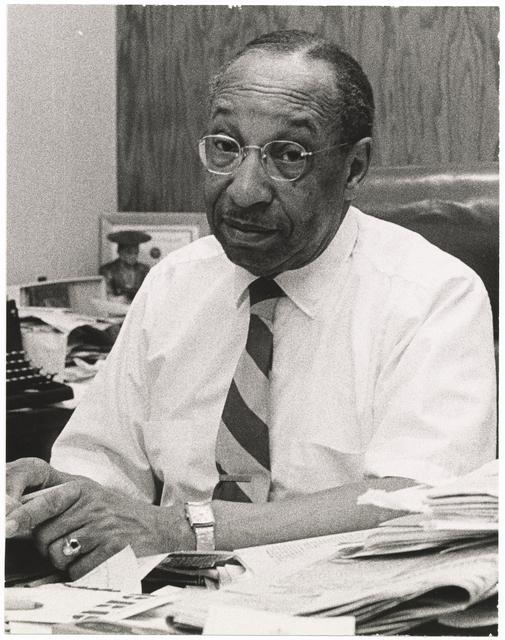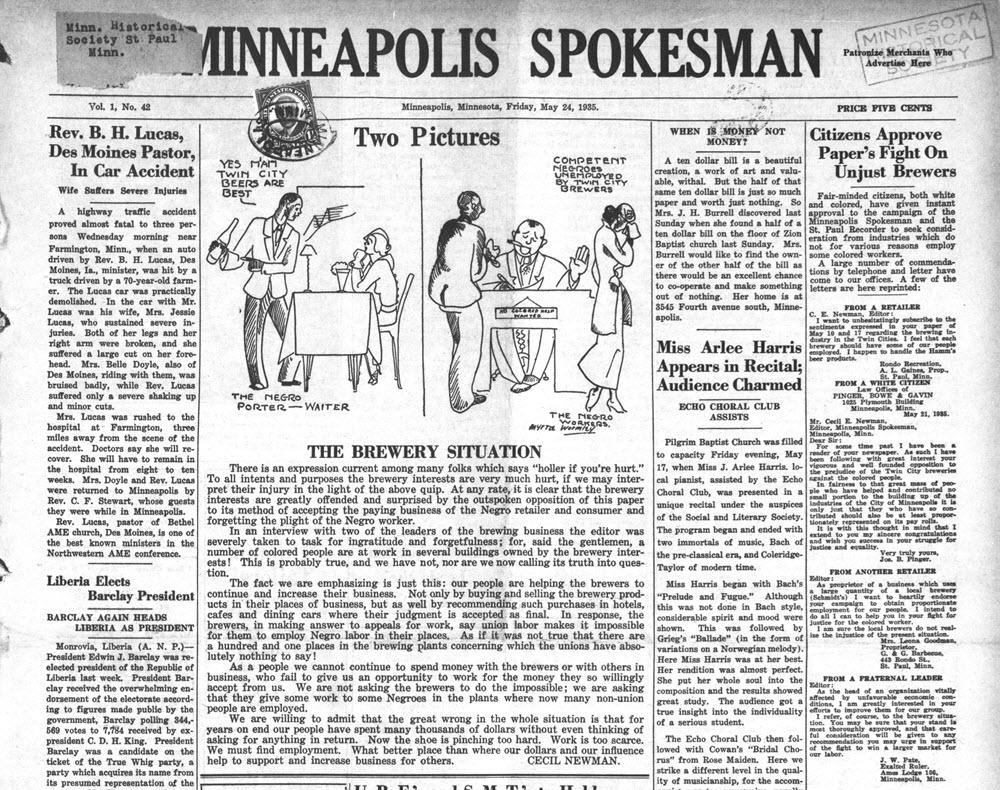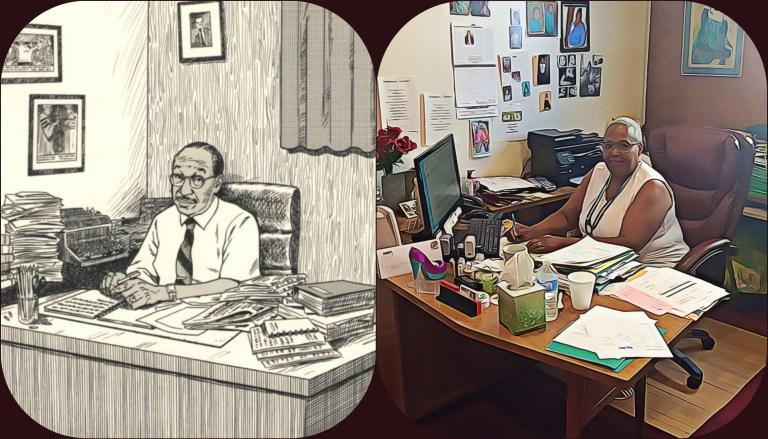Cecil E. Newman: Newspaper Publisher and Advocate for Minnesota’s Black Community
Lynnette Westerlund and Jillian Odland are program associates who work with the Minnesota National Digital Newspaper Program at the Minnesota Historical Society
Chronicling America, the website of the National Digital Newspaper Program (NDNP), is the product of a partnership between the National Endowment for the Humanities (NEH) and the Library of Congress (LC) and contains a treasure trove of over 19 million pages of digitized historical newspapers. The NEH awards grants to institutions with the long-term goal of all U.S. states and territories contributing their digital newspaper content to the NDNP. Chronicling America currently provides access to historical newspapers from 49 states and three territories for the years 1777-1963.
Chronicling America currently includes 220 digitized historical newspapers from 36 states and one territory identified with the subject heading “African American.” The Minnesota NDNP Project has contributed eight of these titles.
Two of those titles, the Minneapolis Spokesman and the St. Paul Recorder, were both founded on August 10, 1934 by Cecil Newman, a respected leader in Minnesota’s African-American community. Newman used his position and papers to fight against racial discrimination locally and nationally and to support and improve the lives of Black Minnesotans. These newspapers, as well as the Twin-City Herald, an earlier Cecil Newman publication, are available on Chronicling America for the years 1934–1963.
Newman’s Life
Cecil Newman was born in Kansas City, Missouri, in July 1903. As a boy, Newman showed an early interest in journalism, selling newspapers to make extra money and working in the office of the Kansas City Call, a Black community paper. He moved to Minneapolis, Minnesota, in 1922, looking for opportunities to work in the newspaper field. To support himself, Newman worked as a bellhop at the Elks Club and later as a railroad porter for the Pullman Company. He then cofounded his first newspaper, the weekly Twin-City Herald in April 1927, serving as editor until 1934, when he left to start the Spokesman and the Recorder newspapers. Newman also published the monthly Black news magazine Timely Digest between April 1931 and May 1932.
Community-Oriented Newspapers
The Spokesman (Minneapolis) and the Recorder (St. Paul) served as “small town” style newspapers for their respective Black communities. Newman sought to provide a consistent source of local news since other metropolitan dailies carried no special information about the Black population. He felt it also helped the predominantly white cities understand their Black citizens. The issues for each date contained articles tailored to each city and highlighted their particular community’s social events, businesses, clubs, and churches, as well as births, deaths, and weddings.
Editorial Focus and Political Involvement
Newman’s editorial in the first issues of the Spokesman and the Recorder swore “to speak out fearlessly and unceasingly against injustice, discrimination and all imposed inequalities.” The papers covered national news and issues related to race and racial discrimination and the struggle for civil rights, including the trial of the Scottsboro boys in the 1930s, Paul Robeson’s controversial statements on Communism, and the 1954 Brown vs Board U.S. Supreme Court decision. During World War II, the Spokesman and the Recorder covered the actions and deaths of local Black servicemen overseas, while also reporting on racism in the military.
The newspapers sponsored regular community forums at the Hallie Q. Brown Community House in St. Paul and Phyllis Wheatley House in Minneapolis, featuring discussions on social and racial issues and hosting nationally known Black speakers, including W.E.B. DuBois, Mary McLeod Bethune, George Schuyler, and George Washington Carver. Newman frequently expounded on the speakers’ thoughts in subsequent editorials, sometimes harshly criticizing their views. For example, Newman took umbrage at W.E.B. DuBois’s comments when he spoke in Minneapolis in 1935, characterizing the cause of the Black man as hopeless. Newman’s editorial in the Spokesman on March 1, 1935 is entitled, “What a Pity”.
Newman spearheaded action against industries and unions that excluded African-American workers, investigated and exposed cases of job, housing, and business discrimination, and served as the first Black president of the Minneapolis Urban League in 1948. For example, Newman encouraged a boycott starting in the spring of 1935 against racial discrimination in Twin Cities’ breweries. The following are front page political cartoons from the Spokesman and the Recorder about the “Brewery Situation.”
Though Newman’s newspapers claimed political independence, he was active in Democratic politics. He was close with Minnesota politician Hubert Humphrey, serving on the Minneapolis Council on Human Relations during Humphrey’s term as the city’s mayor. This connection began a decades-long relationship with Humphrey. But Newman didn’t limit his network to the Democratic-Farmer-Labor Party (DFL). He also worked with moderate, business-minded Republicans, which was a source of frustration for progressives in the Black community. Newman recognized that Black interests transcended party affiliation.
The Newspapers’ Legacy
Cecil Newman helmed the Minneapolis Spokesman and the St. Paul Recorder until his death in 1976. Newman’s widow, Launa Q. Newman, then took over operation of the papers, merging the two into one title, the Minnesota Spokesman-Recorder, in 2000. Cecil Newman’s granddaughter, Tracey Williams-Dillard, became CEO/Publisher of the paper in 2007 and is still publishing the MN Spokesman-Recorder as Minnesota’s oldest continuously operating Black newspaper.
Bibliography
Bergin, Daniel. “Newman, Cecil (1903–1976).” MNopedia, Minnesota Historical Society. Accessed January 12, 2022. http://www.mnopedia.org/person/newman-cecil-1903-1976
Delton, Jennifer. “Labor, Politics, and African American Identity in Minneapolis, 1930-1950”. Minnesota History, 57 (Winter 2001-2002): 418-434.
Leipold, L. E. Ph.D. Cecil E. Newman: Newspaper Publisher. Minneapolis: T.S. Denison & Company, Inc., 1969.
Minnesota Digital Newspaper Hub, Minnesota Historical Society. Minnesota Spokesman-Recorder. Accessed March 22, 2022. https://www.mnhs.org/newspapers/hub/minnesota-spokesman-recorder
Minnesota Newspaper Association. Minnesota Newspaper Directory (2021): 23. Accessed January 12, 2022. http://mna.org/assets/2021MNADirectoryONLINE.pdf
Nathanson, Iric. “Spokesman for the Community: Cecil Newman and His Legacy of African American Journalism.” Hennepin History Magazine 69 (Fall 2010): 4-21.
Sanna, James. “Twin Cities Daily Planet: Minnesota Spokesman-Recorder Turn 75”. MINNPOST, July 15, 2008. Accessed 1/12/2022. https://www.minnpost.com/perspectives/2008/07/twin-cities-daily-planet-minnesota-spokesman-recorder-turns-75/
Suggs, Henry Lewis. “Democracy on Trial: The Black Press, Black Migration, and the Evolution of Culture and Community in Minnesota, 1965-1970.” In The Black Press in the Middle West, 1985-1985, edited by Henry Lewis Suggs, 165-211. Westport, CT: Greenwood Press, 1995.
Taylor, David Vassar. African Americans in Minnesota. St. Paul, MN: Minnesota Historical Society, 2002.




